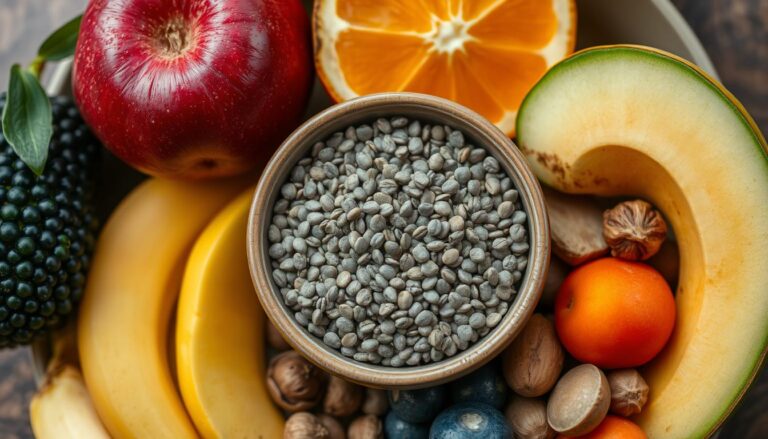The age old adage Let food be thy medicine and medicine be thy food coined by Hippocrates underscores the significance of diet in maintaining health and preventing disease.
The concept of preventive medicine through dietary interventions is gaining traction in modern healthcare.
The role of nutrition in health is multifaceted influencing everything from chronic disease prevention to overall well-being. A food first approach prioritizes dietary solutions over supplements or pharmaceuticals, aligning with the principle of preventive medicine.
Key Takeaways
- Diet plays a crucial role in preventive healthcare.
- Nutrition influences chronic disease prevention and overall well-being.
- A food-first strategy emphasizes dietary solutions over supplements.
- Ancient civilizations recognized the therapeutic potential of food.
- Modern healthcare is shifting towards prevention focused approaches.
The Ancient Wisdom of Food as Medicine
For millennia the idea of food serving as a form of medicine has been a cornerstone of health practices. This concept is rooted in the understanding that the food we consume has a profound impact on our overall health and well-being.
Historical Perspectives Across Cultures
Different cultures have long recognized the medicinal properties of food. The renowned Persian physician Abu Bakr Muhammad ibn Zakariya Razi known as Rhazes in the West was a strong advocate for the use of nutrition in medical treatment.
He emphasized that if a physician could treat a patient with food it was considered a fortunate outcome. This historical perspective underscores the significance of diet in preventing and managing disease.
The evolution of food as medicine can be traced back to Hippocrates’ famous quote Let food be thy medicine. This philosophy has been a guiding principle in the development of modern nutritional science. Various cultures have contributed to this body of knowledge highlighting the importance of nutrition in maintaining health.
From Hippocrates to Modern Nutrition Science
The journey from Hippocrates to modern nutrition science has been marked by significant milestones. The scientific revolution played a crucial role in validating traditional beliefs about food’s medicinal properties through empirical research.
As a result modern nutrition science has come to understand the biochemical mechanisms behind food’s therapeutic effects shifting the focus from viewing food merely as fuel to recognizing its complex role in disease prevention and treatment.
Contemporary research is now validating many traditional food medicine beliefs that were previously dismissed as folklore leading to a more holistic approach to health and diet.
A comprehensive review of historical and modern practices reveals the growing importance of nutritional approaches in conventional medical education and practice.
Understanding the Food First Strategy
As we move towards a more preventive healthcare model the Food First strategy emerges as a key player. This approach emphasizes the role of nutrition in maintaining health and preventing disease marking a significant shift from traditional treatment focused healthcare.

Defining the Food First Approach
The Food-First approach prioritizes whole foods and nutrients as the primary means of achieving and maintaining health.
It’s about recognizing the intrinsic value of food as medicine and leveraging it to prevent illness rather than just treating symptoms. This method encourages a holistic view of health where nutrition is at the forefront of healthcare decisions.
Nutrition experts are increasingly being recognized as vital components of the healthcare team, working alongside doctors and nurses to provide comprehensive care. By focusing on preventive nutrition, individuals can take a proactive role in their health destiny.
Beyond Supplements and Pharmaceuticals
Unlike conventional methods that often rely on supplements or pharmaceuticals, the Food-First strategy advocates for deriving essential nutrients from whole foods. This approach not only provides the body with the necessary building blocks for optimal health but also minimizes the risk of adverse effects associated with supplements or medications.
As Dr. Mark Hyman once said Food is the most powerful medicine we have. By choosing the right foods individuals can significantly reduce their risk of chronic diseases and improve their overall quality of life.
The Shift from Treatment to Prevention
The healthcare landscape is undergoing a paradigm shift moving from a treatment centric model to one that prioritizes prevention. By integrating food-based prevention strategies into conventional healthcare systems we can address the root causes of many chronic diseases more effectively.
This shift requires redefining the roles of healthcare providers to include nutritional expertise and preventive counseling. As healthcare professionals begin to embrace this new paradigm patients are empowered to make informed food choices that support their health and well-being.
According to
The greatest wealth is health a quote often attributed to Virgilunderscores the importance of prioritizing health through preventive measures like the Food-First strategy.
The Science Behind Using Food as Preventive Medicine
As research advances, the science behind food as preventive medicine is becoming increasingly clear offering new insights into health and nutrition.
The connection between the food we eat and our overall health is not just about satisfying hunger or providing energy it’s about understanding how different nutrients and compounds in food interact with our bodies to prevent or potentially exacerbate diseases.
How Nutrients Interact with Your Body
Nutrients from the food we consume play a crucial role in maintaining bodily functions, from the molecular level to overall organ function.
Essential nutrients including vitamins minerals proteins and healthy fats are vital for optimal health. These nutrients can influence various bodily processes such as inflammation immune response, and even gene expression.
For instance certain foods high in antioxidants can help mitigate oxidative stress, thereby potentially reducing the risk of chronic diseases like heart disease and diabetes.
Food Nanoparticles Nature’s Delivery System
Recent discoveries have highlighted the role of food nanoparticles, particularly exosomes in intercellular communication and the delivery of bioactive compounds. These nanoparticles can facilitate the transfer of nutrients and signals between different cells and organs influencing health outcomes.
Research into these natural delivery systems is opening new avenues for understanding how food components can be harnessed for preventive and therapeutic purposes.
Recent Scientific Validations of Traditional Beliefs
Many traditional beliefs about food and health have been dismissed as anecdotal or unscientific. However recent studies have begun to validate some of these beliefs showing that certain foods do indeed have medicinal properties.
For example, research has confirmed the anti-inflammatory effects of compounds found in turmeric and ginger supporting their traditional use in managing pain and inflammation.
Such validations not only underscore the importance of traditional knowledge but also highlight the potential for integrating these foods into modern preventive nutrition strategies.
The scientific validation of traditional food beliefs bridges the gap between ancient wisdom and modern medicine paving the way for a more holistic approach to health and nutrition.
By understanding the benefits of specific foods and their health implications, individuals can make informed choices about their diet, leveraging the preventive potential of food to enhance overall well-being.
Essential Nutrients for Disease Prevention
The journey to optimal health begins with understanding the essential nutrients that play a crucial role in disease prevention. These nutrients are categorized into different groups based on their functions and the quantities required by the body.
Macronutrients: Building Blocks for Health
Macronutrients, including carbohydrates, proteins, and fats, are the body’s primary source of energy and the building blocks for growth and repair. Carbohydrates provide the body with glucose which is vital for brain function and energy production.
Proteins are essential for building and repairing tissues including muscles bones, and skin. Fats particularly omega-3 fatty acids play a critical role in heart health and brain function. A balanced intake of these macronutrients is crucial for maintaining overall health and preventing chronic diseases.
Micronutrients Vital Catalysts for Bodily Functions
Micronutrients comprising vitamins and minerals, are vital for various bodily functions including immune function nerve function, and the regulation of metabolism.
Vitamins such as vitamin C and vitamin D are important for immune function and bone health, respectively.
Minerals like calcium and potassium are crucial for bone health and heart function. Micronutrients act as catalysts in numerous biochemical reactions ensuring that the body’s processes run smoothly. Deficiencies in these micronutrients can lead to a range of health problems underscoring the importance of a nutrient-rich diet.
| Nutrient | Function | Food Sources |
|---|---|---|
| Carbohydrates | Energy source | Whole grains, fruits, vegetables |
| Proteins | Tissue repair and growth | Meat, poultry, fish, legumes, nuts |
| Fats Omega-3 | Heart health, brain function | Fatty fish, nuts, seeds |
Phytonutrients and Bioactive Compounds
Beyond essential nutrients, phytonutrients and bioactive compounds found in plant foods offer additional health benefits. Compounds like polyphenols, carotenoids, and flavonoids have been shown to have antioxidant properties reducing oxidative stress and inflammation.
These compounds also support detoxification pathways and can trigger beneficial adaptive responses in the body. Consuming a variety of colorful foods ensures a broad intake of these beneficial compounds, supporting overall health and disease prevention.
The complex interactions between thousands of phytonutrients in whole foods create effects that cannot be replicated by isolated supplements highlighting the importance of a diverse diet rich in whole, nutrient-dense foods.
Powerful Foods with Preventive Properties
A well-informed diet that includes foods with preventive properties can be a crucial element in maintaining long-term health. By incorporating specific foods into our daily meals we can potentially reduce the risk of various health issues and improve our overall well-being.
Anti-inflammatory Foods
Anti-inflammatory foods play a crucial role in preventing and managing conditions like arthritis and other joint disorders. Foods rich in omega-3 fatty acids such as salmon and sardines are known for their anti-inflammatory properties. Additionally turmeric ginger, and green tea have been recognized for their ability to reduce inflammation and promote health.
Immune-Boosting Foods
Certain foods are renowned for their immune boosting properties, helping to protect against infections and diseases.
Citrus fruits like oranges and grapefruits, rich in vitamin C, are excellent examples. Other immune-boosting foods include garlic, yogurt with live cultures, and leafy greens like spinach all of which contribute to a robust immune system.
Foods for Cardiovascular Health
Foods that support cardiovascular health are essential for preventing heart disease and maintaining a healthy blood circulation system. Fatty fish nuts, and seeds are rich in healthy fats that help lower cholesterol levels.
Berries rich in antioxidants, and whole grains high in fiber also contribute to heart health. A diet rich in these foods can significantly reduce the risk of cardiovascular diseases.
Foods for Joint and Bone Health
Foods that support bone density and joint function are vital for maintaining mobility and preventing conditions like osteoporosis. Calcium-rich foods when combined with vitamin D vitamin K and magnesium containing foods, optimize bone formation and maintenance.
Traditional foods like bone broth, which provides collagen and glucosamine are beneficial for joint health. Silicon-rich foods also contribute to bone formation and connective tissue health.
| Food Category | Examples | Health Benefits |
|---|---|---|
| Anti-inflammatory Foods | Salmon, Turmeric, Ginger | Reduce inflammation, manage arthritis |
| Immune-Boosting Foods | Citrus Fruits, Garlic, Yogurt | Enhance immune system function |
| Cardiovascular Health Foods | Fatty Fish, Nuts, Berries | Support heart health, lower cholesterol |
| Joint and Bone Health Foods | Bone Broth, Calcium-rich Foods, Silicon-rich Foods | Support bone density, joint health |
Creating Your Preventive Nutrition Plan
Creating a personalized nutrition plan can help you take control of your health and reduce the risk of chronic diseases. This involves understanding your nutritional needs building a balanced diet, and implementing effective meal planning strategies.
Assessing Your Nutritional Needs
To create an effective preventive nutrition plan, it’s essential to assess your nutritional needs. This involves considering factors such as age, gender lifestyle, and health status.
For instance, individuals with a family history of heart disease may need to limit their sodium intake, as excessive sodium consumption can increase blood pressure and contribute to cardiovascular disease.
Building a Balanced Preventive Diet
A balanced preventive diet should include a variety of whole foods such as fruits vegetables whole grains, lean and healthy fats.
It’s also important to limit processed and packaged foods which account for more than 70% of Americans’ sodium consumption. By focusing on whole foods and being mindful of dietary choices you can support overall health and well-being.

Read more: The Top Bodybuilding Diet to Build Muscle Fast
Read more Plant Proteins Simple Diet Boost
When planning your diet, consider incorporating foods that provide multiple health benefits. For example foods rich in omega-3 fatty acids, such as salmon can support heart health and reduce inflammation.
Meal Planning Strategies for Optimal Health
Effective meal planning is crucial for maintaining a preventive nutrition plan. This involves strategies such as batch cooking food preparation, and kitchen organization. By planning your meals in advance you can ensure that you’re getting the nutrients you need while also saving time and reducing food waste.
Some key dietary considerations include planning meals that address multiple health goals, such as heart health and blood sugar regulation, and navigating eating out and special occasions while maintaining preventive nutrition principles.
Food as Medicine for Existing Health Conditions
For individuals dealing with existing health issues, understanding the potential of food as a therapeutic tool is crucial. The concept that food can be used to manage and potentially alleviate certain health conditions is rooted in historical and scientific evidence.
Managing Chronic Diseases Through Nutrition
Nutrition plays a pivotal role in managing chronic diseases. Diets rich in essential nutrients can help control conditions such as diabetes hypertension, and heart disease. For instance, a diet high in fiber can help regulate blood sugar levels, while foods low in sodium can aid in managing blood pressure.
Research has shown that specific dietary patterns such as the Mediterranean diet can significantly reduce the risk of chronic diseases. This diet characterized by high consumption of fruits vegetables whole grains, and healthy fats has been associated with improved health outcomes in patients with chronic conditions.
Supporting Recovery and Healing
Food also plays a critical role in supporting recovery and healing. Nutrient-dense foods provide the body with the necessary building blocks to repair tissues fight off infections, and regain strength. For example protein-rich foods are essential for muscle repair, while vitamin C-rich foods can enhance immune function.
When to Combine Food Therapy with Conventional Treatment
While food can be a powerful tool in managing health conditions, there are instances where it should be used in conjunction with conventional medical treatment.
Patients should consult with their healthcare providers to determine the best approach. Certain conditions may require a combination of nutritional therapy and medical interventions to achieve optimal outcomes.
It’s also important to be aware of potential interactions between foods and medications. For instance, certain foods can enhance or inhibit the absorption of drugs affecting their efficacy or increasing the risk of side effects. Open communication between healthcare providers about nutritional approaches being used is crucial for integrated care.
Implementing the Food First Approach in Daily Life
Implementing a food-first approach in daily life requires a multifaceted strategy that incorporates nutritional knowledge lifestyle adjustments, and behavioral changes. This comprehensive method ensures that dietary habits are not only healthy but also sustainable in the long term.
Practical Tips for Busy Lifestyles
For individuals with busy lifestyles, incorporating preventive nutrition can be challenging. Meal planning and prep are crucial. Setting aside time each week to plan and prepare meals can make a significant difference. Additionally keeping healthy snacks on hand can help avoid resorting to unhealthy options.

Read more: Meal Prep Secrets Easy Ways to Lose Weight Without Starving
Overcoming Common Challenges
Common challenges include lack of time, limited access to healthy food options, and old eating habits. Mindful eating practices can help overcome these challenges by fostering a healthier relationship with food. Understanding and addressing emotional triggers for unhealthy eating is also crucial.
Building Sustainable Healthy Eating Habits
Building sustainable habits involves creating an environment that supports healthy choices. This can be achieved by stocking your pantry with nutritious foods and making healthy eating enjoyable. The key is to make preventive eating a pleasurable experience not a chore.
| Strategy | Benefit |
|---|---|
| Meal Planning | Saves time and ensures healthy meals |
| Mindful Eating | Helps develop a healthier relationship with food |
| Healthy Snacking | Prevents resorting to unhealthy food options |
By incorporating these strategies into daily life individuals can successfully implement a food-first approach, enhancing their overall health and well-being.
Conclusion Embracing Food as Your Primary Preventive Medicine
Embracing food as our primary preventive medicine is not just a choice but a necessity for a healthier life. By prioritizing nutrient rich foods we can prevent diseases and enhance our overall health.
This approach empowers individuals to take control of their well-being through informed food choices playing a significant role in preventive care. It’s a paradigm shift towards a sustainable healthy future for all where food is valued for its healing properties.





